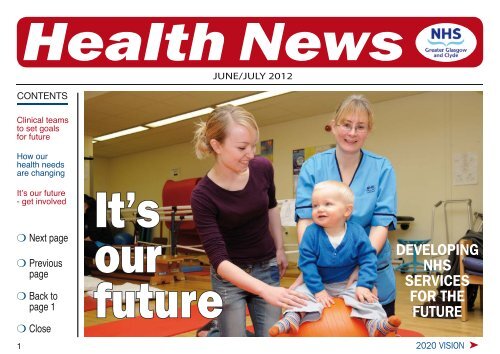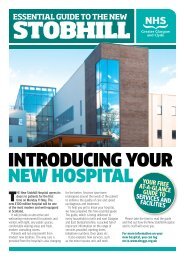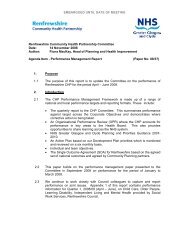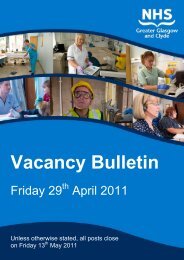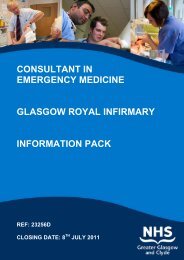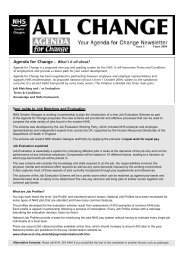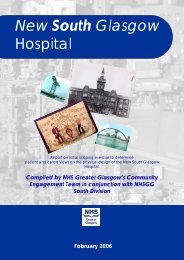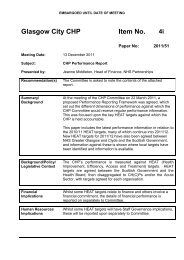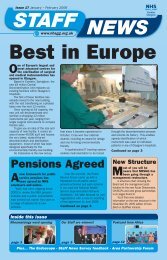Health News - NHS Greater Glasgow and Clyde
Health News - NHS Greater Glasgow and Clyde
Health News - NHS Greater Glasgow and Clyde
Create successful ePaper yourself
Turn your PDF publications into a flip-book with our unique Google optimized e-Paper software.
<strong>Health</strong> <strong>News</strong><br />
JUNE/JULY 2012<br />
CONTENTS<br />
Clinical teams<br />
to set goals<br />
for future<br />
How our<br />
health needs<br />
are changing<br />
It’s our future<br />
- get involved<br />
m Next page<br />
m Previous<br />
page<br />
m Back to<br />
page 1<br />
m Close<br />
1<br />
It’s<br />
our<br />
future<br />
DEVELOPING<br />
<strong>NHS</strong><br />
SERVICES<br />
FOR THE<br />
FUTURE
IT’S OUR FUTURE<br />
<strong>Health</strong> <strong>News</strong><br />
JUNE/JULY 2012<br />
CONTENTS<br />
Clinical teams<br />
to set goals<br />
for future<br />
How our<br />
health needs<br />
are changing<br />
It’s our future<br />
- get involved<br />
m Next page<br />
m Previous<br />
page<br />
m Back to<br />
page 1<br />
m Close<br />
2<br />
tHe SCOttiSH GOveRNMeNt AND<br />
<strong>NHS</strong>SCOtLAND ARe ReSPONDiNG<br />
iN A CHANGiNG wORLD tO PLAN A<br />
BetteR HeALtHCARe SYSteM<br />
2020<br />
vision<br />
SiGNiFiCANt progress<br />
has been made in<br />
recent years through<br />
impressive improvements<br />
in waiting times for access<br />
to high quality healthcare<br />
services <strong>and</strong> treatments.<br />
we have a world leading<br />
patient safety programme<br />
which is making a real<br />
difference to st<strong>and</strong>ards<br />
CONTINUED ON NEXT PAGE ➤<br />
of care <strong>and</strong> to hospital<br />
mortality.<br />
We have made substantial<br />
progress on issues as<br />
varied as access to GPs <strong>and</strong><br />
dentistry, support for people<br />
with long term conditions,<br />
outcomes for cancer, stroke<br />
<strong>and</strong> heart disease.<br />
We are producing improved<br />
Continued on next page
IT’S OUR FUTURE<br />
<strong>Health</strong> <strong>News</strong><br />
JUNE/JULY 2012<br />
CONTENTS<br />
Clinical teams<br />
to set goals<br />
for future<br />
How our<br />
health needs<br />
are changing<br />
It’s our future<br />
- get involved<br />
m Next page<br />
m Previous<br />
page<br />
m Back to<br />
page 1<br />
m Close<br />
2020<br />
vision<br />
Continued from previous page<br />
outcomes for people in terms of reduced<br />
need for hospitalisation, shorter stays,<br />
faster recovery <strong>and</strong> longer life expectancy.<br />
Through our Quality Strategy we have<br />
set ourselves three clearly articulated <strong>and</strong><br />
widely accepted ambitions based on what<br />
people have told us they want from their<br />
<strong>NHS</strong>: care which is person-centred, safe<br />
<strong>and</strong> effective.<br />
We are already seeing real progress in<br />
terms of positive impacts for patients.<br />
For example:<br />
l Improvements in care for people with<br />
long term conditions have resulted in the<br />
avoidance in 2009/10 of over 125,000 bed<br />
days for people aged over 65.<br />
l Improvements in safety in our hospitals<br />
have resulted in a 7% reduction in hospital<br />
st<strong>and</strong>ardised mortality rates since 2007.<br />
l a reduction in the rates of Clostridium<br />
difficile of over 70% since 2007.<br />
We all know that the dem<strong>and</strong>s for<br />
healthcare <strong>and</strong> the circumstances in which<br />
it will be delivered will be radically different<br />
in future years.<br />
Over the next few years we must ensure<br />
that - in the face of these dem<strong>and</strong>s <strong>and</strong><br />
changing circumstances - we can continue<br />
to provide the high quality health service<br />
the people of Scotl<strong>and</strong> expect <strong>and</strong> deserve<br />
into the future.<br />
In order to achieve this, we must<br />
collectively recognise <strong>and</strong> respond to the<br />
most immediate <strong>and</strong> significant challenges<br />
we face - which include Scotl<strong>and</strong>’s public<br />
health record, our changing demography<br />
<strong>and</strong> the economic environment.<br />
Over the next 10 years the proportion<br />
of over 75s in Scotl<strong>and</strong>’s population - who<br />
are the highest users of <strong>NHS</strong> services -<br />
will increase by over 25%. By 2033 the<br />
number of people over 75 is likely to have<br />
increased by almost 60%.<br />
There will be a continuing shift in the<br />
pattern of disease towards long term<br />
conditions, particularly with growing<br />
numbers of older people with multiple<br />
conditions <strong>and</strong> complex needs such as<br />
dementia.<br />
Over the next 20 years demography<br />
alone could increase expenditure on health<br />
<strong>and</strong> social care by over 70%.<br />
Scottish public expenditure will fall<br />
in real terms in the period to 2014/15.<br />
The revenue position for the <strong>NHS</strong> has<br />
been relatively protected. However that<br />
vital protection needs to be seen in the<br />
context of the global pressures on health<br />
spending. To meet those pressures, health<br />
boards are working this year to release<br />
cash savings of £300 million to be retained<br />
locally.<br />
We must be bold enough to visualise<br />
the <strong>NHS</strong> that will best meet the needs of<br />
the future in a way that is sustainable, <strong>and</strong><br />
then make the changes necessary to turn<br />
that vision into reality.<br />
We remain committed to the values of<br />
<strong>NHS</strong>Scotl<strong>and</strong>: the values of collaboration<br />
<strong>and</strong> cooperation partnership working<br />
across <strong>NHS</strong>Scotl<strong>and</strong>, with patients <strong>and</strong><br />
with the voluntary sector; of continued<br />
investment in the public sector rather<br />
than the private sector; of increased<br />
flexibility, provision of local services <strong>and</strong> of<br />
openness <strong>and</strong> accountability to the public.<br />
We oppose the route being considered<br />
in <strong>NHS</strong> Engl<strong>and</strong> as their response to the<br />
global challenges.<br />
<strong>NHS</strong>Scotl<strong>and</strong> <strong>and</strong><br />
Scottish Government<br />
OUR vision is that<br />
by 2020 everyone is<br />
able to live longer<br />
healthier lives at<br />
home, or in a homely<br />
setting.<br />
We will have a<br />
healthcare system<br />
where we have<br />
integrated health<br />
<strong>and</strong> social care, a<br />
focus on prevention,<br />
anticipation <strong>and</strong><br />
supported self<br />
management. When<br />
hospital treatment is<br />
required, <strong>and</strong> cannot<br />
be provided in a<br />
community setting,<br />
day case treatment<br />
will be the norm.<br />
Whatever the<br />
setting, care will<br />
be provided to the<br />
highest st<strong>and</strong>ards of<br />
quality <strong>and</strong> safety,<br />
with the person at<br />
the centre of all<br />
decisions. There<br />
will be a focus on<br />
ensuring that people<br />
get back into their<br />
home or community<br />
environment as soon<br />
as appropriate, with<br />
minimal risk of readmission.<br />
3<br />
NOW WHO DO YOU SEE ➤
IT’S OUR FUTURE<br />
<strong>Health</strong> <strong>News</strong><br />
JUNE/JULY 2012<br />
CONTENTS<br />
Clinical teams<br />
to set goals<br />
for future<br />
How our<br />
health needs<br />
are changing<br />
It’s our future<br />
- get involved<br />
m Next page<br />
m Previous<br />
page<br />
m Back to<br />
page 1<br />
m Close<br />
4<br />
Why we should all play a part<br />
in shaping future services<br />
By Robert Calderwood<br />
Chief Executive, <strong>NHS</strong> <strong>Greater</strong> <strong>Glasgow</strong><br />
<strong>and</strong> <strong>Clyde</strong><br />
tHiS special edition of <strong>Health</strong><br />
<strong>News</strong> is dedicated to setting out<br />
why we need to look beyond the<br />
immediate future <strong>and</strong> plan longerterm<br />
how we must design services<br />
to meet the changing health needs of<br />
our population.<br />
The interviews <strong>and</strong> articles spell out<br />
the challenges we face <strong>and</strong> how we<br />
can all ensure we can play our part in<br />
shaping <strong>NHS</strong> healthcare in the future –<br />
<strong>and</strong> how it is delivered.<br />
I see this as an opportunity to be<br />
innovative <strong>and</strong> forward-thinking in our<br />
approach to planning for the future. at<br />
our disposal will be the best evidence<br />
we can collate about our changing<br />
population profile <strong>and</strong> forecasts of<br />
developments in healthcare. We will<br />
have the best predictions about new<br />
approaches to care <strong>and</strong> how to deliver<br />
closer team working across the areas<br />
of acute medicine <strong>and</strong> primary care.<br />
Our patient forums <strong>and</strong> clinical groups<br />
will also explore new alliances between<br />
<strong>NHS</strong> services <strong>and</strong> council social care<br />
services, coupled with the voluntary<br />
sector.<br />
CONTINUED ON NEXT PAGE ➤<br />
as the title of this edition of our <strong>Health</strong><br />
<strong>News</strong> says “It’s Our Future” <strong>and</strong> I am<br />
determined to ensure that all of us can<br />
play a part in shaping it.<br />
I am encouraged that our clinicians<br />
see this as an opportunity to step back<br />
<strong>and</strong> take some time to look forward<br />
with an open mind as to how we might<br />
do things differently in 2020 to drive up<br />
quality <strong>and</strong> effectiveness <strong>and</strong> better<br />
meet patient needs <strong>and</strong> expectations.<br />
all too often when “change” is<br />
mentioned it creates a negative<br />
response from people who want to<br />
retain the status quo. But we should be<br />
confident about the positive benefits<br />
that change brings <strong>and</strong> stride forward<br />
with blue-sky thinking <strong>and</strong> bold<br />
ambitions. Change is not new <strong>and</strong> the<br />
changes we have witnessed in recent<br />
years have all been undeniably good.<br />
One thing that no-one can refute<br />
today is that the changes in our <strong>NHS</strong><br />
that have taken place over recent<br />
decades have delivered fantastic<br />
improvements on patient outcomes<br />
from what used to be the case.<br />
Right across our healthcare system<br />
patients are getting better treatments,<br />
faster treatments <strong>and</strong> better outcomes.<br />
Take cancer services as an example –<br />
Continued on next page<br />
Robert Calderwood... We’re all in this together - patients of<br />
all ages <strong>and</strong> our staff.
IT’S OUR FUTURE<br />
<strong>Health</strong> <strong>News</strong><br />
JUNE/JULY 2012<br />
CONTENTS<br />
Clinical teams<br />
to set goals<br />
for future<br />
How our<br />
health needs<br />
are changing<br />
It’s our future<br />
- get involved<br />
m Next page<br />
Why we should all play a part in shaping future services<br />
Continued from previous page<br />
the treatments <strong>and</strong><br />
outcomes today are<br />
unrecognisable to those of<br />
a decade ago.<br />
The same sorts of<br />
improvements are reflected<br />
throughout our services<br />
<strong>and</strong> a good example of<br />
that is the management<br />
of long-term chronic<br />
health conditions such as<br />
diabetes.<br />
We can expect this<br />
remarkable evolution<br />
of health service<br />
improvement to continue<br />
apace. Our task today<br />
is to try <strong>and</strong> ensure that<br />
we shape our services<br />
Robert Calderwood<br />
<strong>and</strong> use our resources in<br />
the best way possible to<br />
harness what the future<br />
may bring <strong>and</strong> shape our<br />
services to the changing<br />
needs of the population a<br />
decade from now <strong>and</strong> even<br />
beyond.<br />
This edition of <strong>Health</strong><br />
<strong>News</strong> explores in some<br />
detail the predicted<br />
changes that will occur<br />
in our population in the<br />
next ten to 15 years <strong>and</strong><br />
how their health needs will<br />
change. I aim to ensure<br />
there is a real opportunity<br />
for patients, health related<br />
charities <strong>and</strong> volunteer<br />
agencies to make a<br />
difference to planning the<br />
future – let’s face it, we are<br />
in this together.<br />
Medical experts from<br />
across <strong>Glasgow</strong> <strong>and</strong> <strong>Clyde</strong><br />
will lead seven working<br />
groups to examine ways of<br />
developing services fit for<br />
the future.<br />
For each of the clinical<br />
groups there will be<br />
a “Patient Reference<br />
Group” with around 30<br />
members (individuals<br />
<strong>and</strong> organisation<br />
representatives) <strong>and</strong> a<br />
single overarching group<br />
listening to the issues <strong>and</strong><br />
giving their input directly<br />
in to the related clinical<br />
groups.<br />
We believe that it is<br />
important to involve<br />
you – whether you are<br />
a healthcare worker, a<br />
patient, a volunteer or<br />
someone who just has<br />
a view – in planning the<br />
future shape of clinical<br />
services across <strong>NHS</strong><br />
<strong>Greater</strong> <strong>Glasgow</strong> <strong>and</strong><br />
<strong>Clyde</strong>.<br />
Whatever your views<br />
we want to hear from you.<br />
We’re in this together<br />
<strong>and</strong> this is an opportunity<br />
to share the best ideas<br />
to help plan ahead <strong>and</strong><br />
ensure our clinical services<br />
are fit for the future.<br />
We look forward to<br />
working with all of our<br />
stakeholders to ensure<br />
we are able to deliver the<br />
highest quality services<br />
with the resources we have<br />
to meet the population<br />
needs between 2015 <strong>and</strong><br />
2020.<br />
m Previous<br />
page<br />
m Back to<br />
page 1<br />
m Close<br />
5<br />
NOW WHO DO YOU SEE ➤
IT’S OUR FUTURE<br />
<strong>Health</strong> <strong>News</strong><br />
JUNE/JULY 2012<br />
CONTENTS<br />
Clinical teams<br />
to set goals<br />
for future<br />
How our<br />
health needs<br />
are changing<br />
It’s our future<br />
- get involved<br />
m Next page<br />
m Previous<br />
page<br />
m Back to<br />
page 1<br />
m Close<br />
6<br />
Clinical teams to set<br />
goals for the future<br />
By Dr Jennifer<br />
Armstrong<br />
Medical Director<br />
MUCH has<br />
already been<br />
achieved<br />
to improve clinical<br />
services <strong>and</strong> drive<br />
up st<strong>and</strong>ards of care<br />
within <strong>NHS</strong> <strong>Greater</strong><br />
<strong>Glasgow</strong> <strong>and</strong> <strong>Clyde</strong>.<br />
We have also<br />
benefited from<br />
unprecedented levels<br />
of investment <strong>and</strong> have<br />
delivered a br<strong>and</strong> new<br />
regional cancer centre<br />
at the Beatson <strong>and</strong><br />
state-of-the-art facilities<br />
at the New Stobhill<br />
<strong>and</strong> Victoria hospitals,<br />
together with the new<br />
£842million hospital in<br />
the Southern General<br />
site which will, for the<br />
first time, bring together<br />
key services for children<br />
<strong>and</strong> adults onto one<br />
site.<br />
However there is<br />
still a lot to do to drive<br />
forward innovation in<br />
healthcare to ensure<br />
we continue to deliver<br />
excellent care both<br />
for patients in the<br />
community <strong>and</strong> those<br />
who require hospital<br />
treatment.<br />
We have therefore<br />
asked some of our<br />
most experienced<br />
clinicians to work with<br />
their clinical colleagues<br />
<strong>and</strong> lead a review of our<br />
clinical services.<br />
They will be joined<br />
in this by public<br />
health consultants,<br />
university academics<br />
<strong>and</strong> staff <strong>and</strong> patient<br />
representatives,<br />
managers <strong>and</strong> health<br />
planning experts.<br />
Over the next few<br />
months, these teams<br />
will examine health<br />
services across primary<br />
<strong>and</strong> secondary care<br />
within <strong>NHS</strong>GGC.<br />
They will highlight<br />
areas where future<br />
developments will<br />
require a different<br />
approach to get the<br />
best care for patients<br />
<strong>and</strong> will also identify the<br />
many areas where we<br />
are already doing well.<br />
They will test their<br />
emerging thinking with<br />
colleagues as they go<br />
along. Patient groups<br />
have also been set up<br />
to ensure we listen to<br />
what patients are telling<br />
us <strong>and</strong> ensure that they<br />
The new £842million South <strong>Glasgow</strong> hospitals campus –<br />
on track for 2015 opening.<br />
are aware of how we are<br />
developing our thinking.<br />
We have encouraged<br />
the groups to think<br />
innovatively <strong>and</strong> draw<br />
on best practice <strong>and</strong><br />
the latest technologies<br />
available.<br />
I want to see the<br />
development of a<br />
flexible healthcare<br />
system which responds<br />
to each patient as<br />
a unique individual,<br />
with care delivered by<br />
skilled staff who feel<br />
their own contribution<br />
is valued while making<br />
best use of the available<br />
resources to meet<br />
dem<strong>and</strong>.<br />
I believe that we now<br />
have the opportunity<br />
to build on our record<br />
of achievements <strong>and</strong><br />
deliver this.
IT’S OUR FUTURE<br />
<strong>Health</strong> <strong>News</strong><br />
JUNE/JULY 2012<br />
CONTENTS<br />
Clinical teams<br />
to set goals<br />
for future<br />
How our<br />
health needs<br />
are changing<br />
It’s our future<br />
- get involved<br />
m Next page<br />
m Previous<br />
page<br />
m Back to<br />
page 1<br />
m Close<br />
7<br />
MeDiCAL<br />
experts<br />
from<br />
across <strong>NHS</strong><br />
<strong>Greater</strong> <strong>Glasgow</strong><br />
<strong>and</strong> <strong>Clyde</strong> will lead<br />
seven working<br />
groups to examine<br />
how our clinical<br />
services should<br />
be delivered in the<br />
future.<br />
the groups<br />
will make<br />
recommendations<br />
on how services<br />
should be<br />
organised beyond<br />
2015 to deliver<br />
safe, sustainable<br />
<strong>and</strong> patientfocused<br />
care<br />
that will achieve<br />
the best health<br />
outcomes for<br />
patients.<br />
each group will<br />
review current<br />
services <strong>and</strong> best<br />
practice in the<br />
field <strong>and</strong> examine<br />
the implications<br />
of developing<br />
technologies <strong>and</strong><br />
predicted changes<br />
in population<br />
health <strong>and</strong><br />
epidemiology in<br />
order to develop<br />
their proposals.<br />
Population health<br />
THIS group will be reviewing the health,<br />
demographics (e.g. age) <strong>and</strong> needs of the<br />
people who live in the <strong>Greater</strong> <strong>Glasgow</strong><br />
<strong>and</strong> <strong>Clyde</strong> area, thinking about how that<br />
might change over the next few years <strong>and</strong><br />
how our services should adapt. It will<br />
focus on the differences between those<br />
with the best <strong>and</strong> worst health <strong>and</strong> how<br />
we might close that gap.<br />
Membership: dr Emilia Crighton,<br />
Consultant in Public <strong>Health</strong> Medicine<br />
(Chair) pictured right<br />
Public <strong>Health</strong> – dr Helene Irvine, dr<br />
david Morrison, dr Stan Murray, dr John<br />
O’dowd, dr anne Scoular<br />
Other clinicians - dr Kevin Fellows<br />
Patient representatives - Mr George<br />
Planned care<br />
THIS group will be<br />
reviewing how best to<br />
provide planned care<br />
in the future. Planned<br />
care is the provision of<br />
routine services with<br />
planned appointments<br />
or interventions in a<br />
hospital (outpatients,<br />
day cases, planned<br />
surgery) or community settings e.g. in<br />
your GP surgery or health centre.<br />
Membership:<br />
Mr George Welch, Vascular Consultant<br />
<strong>and</strong> Clinical director, Surgical Specialties<br />
(Chair) pictured right<br />
Clinicians - Mr Joetienne abela, Mr<br />
McGuiness, Mrs<br />
Margaret Millmaker<br />
Staff representatives -<br />
Mr Graham Capstick,<br />
Mr Greg Usrey<br />
University<br />
representatives<br />
- Professor anna<br />
Cooper, Professor Jill<br />
Pell<br />
Management <strong>and</strong><br />
planning - Mr Khalid<br />
Bashir, Mrs Norma<br />
Greenwood, Mrs anne Hawkins, Ms Sue<br />
laughlin<br />
GP representatives - dr Mark Fawcett, dr<br />
Patricia Moultrie<br />
ahmed alani, dr Kevin Fellows, Mr Mike<br />
Gavin, Mr Gerald McGarry, Mr dominic<br />
Meek, Mrs lesley Meikle, dr John Morris,<br />
dr anne Marie Sinclair, Mr david Wright<br />
Public <strong>Health</strong> – dr Helene Irvine, dr Stan<br />
Murray<br />
Patient representatives – Mrs Heather<br />
Gartshore, Mrs anne Mcdougall<br />
Staff representatives - Mr Garry<br />
Campbell, Ms Maureen Cullen<br />
University representative – Professor Paul<br />
Horgan<br />
Management <strong>and</strong> planning - Mr Jim<br />
Crombie, Ms Jackie Erdman, Mr Keith<br />
Redpath, Mr Barry Sillars<br />
GP representative – dr <strong>and</strong>rew Townsley<br />
The health of<br />
women, children<br />
<strong>and</strong> young people<br />
THIS group will be<br />
reviewing services that<br />
provide medical care<br />
for mothers, children<br />
<strong>and</strong> young people.<br />
They include<br />
maternity services,<br />
prenatal <strong>and</strong> postnatal<br />
care, gynaecology<br />
<strong>and</strong> inpatient <strong>and</strong><br />
outpatient services for<br />
infants, children <strong>and</strong> young people up<br />
to the age of 16.<br />
Membership:<br />
dr linda de Caestecker, director of<br />
Public <strong>Health</strong> (Chair) pictured above<br />
Clinicians - dr Jim Beattie, Mr Roderick<br />
duncan, dr Morton Hair, Miss Cathy<br />
Harkins, Mr Haytham Kubba, Mrs Elaine<br />
love, dr alan Mathers, dr lesley Nairn,<br />
dr Stuart O’Toole, dr allyson Ramsay,<br />
dr Paul Ryan, Mrs Eleanor Stenhouse,<br />
dr Graham Stewart<br />
Public <strong>Health</strong> - dr John O’dowd<br />
Patient representative - Mrs dagmar<br />
Kerr<br />
Staff representatives - Mrs Julie Boyd,<br />
Ms anne Thomson<br />
University representative - Professor<br />
Faisal ahmed<br />
Management <strong>and</strong> planning – Mr Gary<br />
dover, Mr Mark Feinmann, Mr Kevin Hill,<br />
Ms Janis Hughes<br />
GP representatives – dr Kathryn<br />
Mclachlan, dr Georgina Brown<br />
MORE CLINICAL GROUPS ➤
IT’S OUR FUTURE<br />
<strong>Health</strong> <strong>News</strong><br />
JUNE/JULY 2012<br />
CONTENTS<br />
Clinical teams<br />
to set goals<br />
for future<br />
How our<br />
health needs<br />
are changing<br />
It’s our future<br />
- get involved<br />
m Next page<br />
m Previous<br />
page<br />
m Back to<br />
page 1<br />
m Close<br />
8<br />
Chronic diseases/long term conditions<br />
IN recent years more <strong>and</strong><br />
more people have been<br />
successfully living with<br />
<strong>and</strong> managing a long term<br />
condition, such as diabetes,<br />
chronic respiratory disease<br />
or heart disease. The<br />
care of chronic disease is<br />
delivered both in hospital <strong>and</strong><br />
community settings <strong>and</strong> is<br />
often managed by patients<br />
themselves who become<br />
experts in the own condition<br />
<strong>and</strong> its treatment. This group<br />
will review how best to<br />
support patients with long<br />
term conditions in the future.<br />
Membership:<br />
dr david Murdoch, Consultant<br />
Physician <strong>and</strong> Cardiologist,<br />
Southern General Hospital<br />
(Chair) pictured right<br />
Clinicians - dr Stephen<br />
Banham, Ms Joyce Brown,<br />
dr <strong>and</strong>rew Gallagher, dr<br />
Brian Kennon, dr Graeme<br />
MacPhee, dr david Marshall,<br />
dr John Nugent, dr Colin<br />
O’leary, dr duncan Porter<br />
Public <strong>Health</strong> - dr anne<br />
Scoular<br />
Unplanned, emergency <strong>and</strong> trauma care<br />
THIS group will be making<br />
recommendations on how<br />
unplanned care should<br />
be provided. Unplanned<br />
care is health care which<br />
cannot reasonably be<br />
foreseen or planned in<br />
advance. It is urgent<br />
care that can occur any<br />
time <strong>and</strong> services must<br />
be available 24 hours a<br />
day seven days a week.<br />
Emergency care is for<br />
patients suffering serious<br />
illnesses such as heart<br />
attacks, strokes etc or<br />
traumatic injuries such as<br />
car accidents, assault or<br />
abuse. Unplanned care<br />
also includes accidents<br />
Patient representatives - Mr<br />
Peter Bole, Mr Bill Cameron<br />
Staff representatives - Mrs<br />
Marie lowe, Ms dorothy<br />
McErlean<br />
University representatives -<br />
Professor John McMurray,<br />
Professor Rhian Touyz<br />
Management <strong>and</strong> planning<br />
- Mrs Jane Grant, Mr david<br />
leese, Ms Fiona McKay, Ms<br />
Karen Ross<br />
GP representatives – dr John<br />
dempster, dr douglas Colville<br />
that need stitches, X-rays<br />
or plastered. These may<br />
not be as urgent but can<br />
happen at any time.<br />
Membership:<br />
dr david Stewart, lead<br />
director, acute Medical<br />
Services (Chair) pictured<br />
right<br />
Clinicians - dr Norman<br />
Gaw, dr alistair Irel<strong>and</strong>,<br />
dr William leach, Mr<br />
Colin K MacKay,<br />
Professor Martin<br />
McIntyre, dr<br />
Gerard McKay, dr<br />
alan Mitchell, dr<br />
david Raeside, dr Iain<br />
Robertson, dr Stuart<br />
Rodger, dr Jennifer<br />
Tilston, Mr Gerry Wright<br />
Public <strong>Health</strong> – dr Helene<br />
Irvine, dr Stan Murray<br />
Patient representatives –<br />
Mrs anne Marie Kennedy,<br />
Mr George Stewart<br />
Staff representatives - Mr<br />
Paul Mathews, Mrs Cathy<br />
Miller<br />
Management <strong>and</strong><br />
planning - Mr Grant<br />
archibald, Mr <strong>and</strong>y<br />
Crawford, Ms Heather<br />
McVey, Mrs Julie Murray,<br />
Ms Jac Ross<br />
GP representatives –dr<br />
John Ip, dr Jean Powell<br />
Cancer services<br />
THIS group will review the<br />
services that deal with the<br />
screening <strong>and</strong> diagnosis<br />
of cancers – inpatient <strong>and</strong><br />
outpatient treatment, follow up<br />
care <strong>and</strong> prevention.<br />
Membership:<br />
Mr Ian Finlay, associate<br />
Medical director, Surgery <strong>and</strong><br />
anaesthetics (Chair) pictured<br />
Clinicians - dr Hilary dobson, dr<br />
david dodds, dr david dunlop,<br />
dr Karen Guerrero, Mr Grant<br />
Fullerton, Mr douglas Hansell,<br />
dr Helen Morrison, dr Kenneth<br />
O’Neill, dr<br />
anne Parker,<br />
Mr Khaver<br />
Qureshi, dr<br />
dave Sharma,<br />
Mr John<br />
Stuart<br />
Public <strong>Health</strong><br />
- dr david<br />
Morrison<br />
Patient<br />
representative<br />
– Mr Tom<br />
Haswell<br />
Staff representatives<br />
- Mr<br />
Stuart Burnside, Mrs Frances<br />
lyall<br />
University representative –<br />
Professor Jeff Evans<br />
Management <strong>and</strong> planning - Mr<br />
Jonathan Best, Ms Marjorie<br />
Johns, Mrs Karen Murray<br />
GP representative – dr Gordon<br />
Forrest<br />
MORE CLINICAL TEAMS ➤
CONTENTS<br />
Clinical teams<br />
to set goals<br />
for future<br />
How our<br />
health needs<br />
are changing<br />
It’s our future<br />
- get involved<br />
m Next page<br />
m Previous<br />
page<br />
m Back to<br />
page 1<br />
m Close<br />
9<br />
Older people<br />
THIS group will review the health services<br />
that provide care <strong>and</strong> treatment for older<br />
people in both hospital <strong>and</strong> community<br />
settings. These include acute<br />
assessment, rehabilitation, continuing<br />
care beds <strong>and</strong> elderly mental illness.<br />
Membership:<br />
dr Margaret Roberts, associate Medical<br />
director, Rehabilitation <strong>and</strong> assessment<br />
(Chair) pictured below<br />
Clinicians - dr adam Bowman, Miss<br />
Elaine Burt,<br />
dr George<br />
duncan, dr<br />
Richard Groden,<br />
dr Graham<br />
Jackson, dr<br />
Tricia Moylan, dr<br />
Colin McCarthy,<br />
dr Helen<br />
Slavin, dr Carol<br />
Wilkieson<br />
Public <strong>Health</strong> - dr anne Scoular<br />
Patient representative - Mr Robert Smith<br />
Staff representatives - Mr Gordon<br />
<strong>and</strong>erson, Mrs anne dean, Mr Rob Gray<br />
University representatives – Professor<br />
Peter langhorne, Professor david Stott<br />
Management <strong>and</strong> planning - Ms anne<br />
Harkness, Mr alex MacKenzie, Mr<br />
Hamish Battye<br />
GP representatives – dr Michael<br />
Haughney, dr Caroline Holms<br />
all seven groups are being supported by<br />
<strong>NHS</strong>GGC planning <strong>and</strong> policy leads, Ms<br />
Sharon adamson <strong>and</strong> Mrs lorna Kelly.<br />
IT’S OUR FUTURE<br />
<strong>Health</strong> <strong>News</strong><br />
JUNE/JULY 2012<br />
GPs to the fore in planning procedure<br />
PRiMARY care health<br />
professionals are<br />
an integral part of<br />
each of the clinical<br />
groups. GPs <strong>and</strong> other<br />
community based<br />
clinical representatives<br />
will join with community<br />
healthcare staff in<br />
driving forward the work<br />
that will help shape how<br />
our services need to be<br />
developed to serve the<br />
changing needs of the<br />
population.<br />
Dr Richard Groden, a<br />
<strong>Glasgow</strong> GP <strong>and</strong> Clinical<br />
Director of <strong>Glasgow</strong><br />
City Community<br />
<strong>Health</strong> Partnership<br />
said: “Delivering <strong>NHS</strong><br />
services to best effect<br />
in the future will require<br />
more team working <strong>and</strong><br />
collaboration between<br />
community services<br />
<strong>and</strong> acute services<br />
colleagues. there are<br />
terrific opportunities for<br />
us to explore how we<br />
can improve the delivery<br />
of services.<br />
“A number of GPs,<br />
community based<br />
clinical directors,<br />
community nursing<br />
colleagues <strong>and</strong> primary<br />
care health managers<br />
will be playing a full role<br />
within both the clinical<br />
groups <strong>and</strong> the patient<br />
reference groups.”<br />
Changing roles for nursing professionals<br />
tHe role of nurses<br />
<strong>and</strong> allied health<br />
professionals such<br />
as physiotherapists,<br />
dieticians <strong>and</strong><br />
optometrists has<br />
changed dramatically<br />
over the past few<br />
decades. the range of<br />
patient interventions<br />
<strong>and</strong> direct care they<br />
deliver both in the<br />
community <strong>and</strong><br />
within acute hospitals<br />
has increased<br />
significantly. As<br />
key <strong>and</strong> integral<br />
members of the <strong>NHS</strong><br />
healthcare team they<br />
will play a crucial<br />
role in the process to<br />
plan services for the<br />
future.<br />
Our Board Nurse<br />
Director Rosslyn<br />
Crocket said:<br />
“Perhaps more<br />
than ever before<br />
nurses have a real<br />
opportunity to help<br />
define the longer<br />
term future of health<br />
care service delivery.<br />
in <strong>Greater</strong> <strong>Glasgow</strong><br />
<strong>and</strong> <strong>Clyde</strong> we are<br />
planning for how our<br />
services need to look<br />
to serve the changing<br />
population needs<br />
beyond 2015 <strong>and</strong> well<br />
into 2020 <strong>and</strong> beyond.<br />
this work will require<br />
vision <strong>and</strong> bold<br />
thinking.<br />
“the evidence of<br />
the past <strong>and</strong> the huge<br />
strides in patient care<br />
will continue apace<br />
over the next decade<br />
<strong>and</strong> i want nursing<br />
to play its full part in<br />
this <strong>and</strong> help shape<br />
services that really<br />
are fit to take us well<br />
into the future with a<br />
planned <strong>and</strong> strategic<br />
approach to change<br />
<strong>and</strong> modernisation.”<br />
HOW OUR HEALTH NEEDS ARE CHANGING ➤
IT’S OUR FUTURE<br />
<strong>Health</strong> <strong>News</strong><br />
JUNE/JULY 2012<br />
CONTENTS<br />
Clinical teams<br />
to set goals<br />
for future<br />
How our<br />
health needs<br />
are changing<br />
It’s our future<br />
- get involved<br />
m Next page<br />
How our health<br />
needs are changing<br />
By Dr emilia Crighton<br />
HeALtHCARe has<br />
changed drastically<br />
since 1993 when i<br />
began my career as a junior<br />
doctor in inverness.<br />
Not that long ago (20 years<br />
ago), a heart attack was<br />
treated with strict bed rest for<br />
several weeks, clot-busting<br />
drugs were still on trial, almost<br />
all surgery required overnight<br />
stay in hospital <strong>and</strong> there were<br />
hardly any computers.<br />
Today, you’re likely to be out<br />
of hospital within five days of<br />
treatment for a heart attack,<br />
the vast majority of operations<br />
are carried out as a day<br />
procedure, we have electronic<br />
patient records <strong>and</strong> patients<br />
looking up their own diagnosis<br />
on the internet.<br />
<strong>and</strong> survival rates for<br />
cancer are now significantly<br />
better thanks to advances in<br />
treatment <strong>and</strong> diagnosis.<br />
There’s no doubt that with<br />
Continued on next page<br />
‘<br />
Overall our<br />
health has<br />
improved<br />
<strong>and</strong> we are<br />
living longer<br />
’<br />
- Dr emilia Crighton<br />
m Previous<br />
page<br />
m Back to<br />
page 1<br />
m Close<br />
10<br />
CONTINUED ON NEXT PAGE ➤
CONTENTS<br />
Clinical teams<br />
to set goals<br />
for future<br />
How our<br />
health needs<br />
are changing<br />
It’s our future<br />
- get involved<br />
m Next page<br />
m Previous<br />
page<br />
m Back to<br />
page 1<br />
m Close<br />
11<br />
Continued from<br />
previous page<br />
these significant<br />
technological advances<br />
in medicine, we<br />
have also witnessed<br />
increased expectations<br />
of what people get<br />
out of healthcare <strong>and</strong><br />
increased dem<strong>and</strong> on<br />
our services.<br />
In my first year as<br />
Senior House Officer in<br />
the Medical Receiving<br />
Ward, we saw 12 or 13<br />
admissions a day.<br />
Within three years,<br />
while a Registrar, I was<br />
seeing nearly forty a<br />
day.<br />
<strong>Health</strong>care activity<br />
has continued to rise<br />
over the past two<br />
decades <strong>and</strong> as we<br />
plan our services for<br />
2020 <strong>and</strong> beyond we<br />
are analysing what has<br />
driven that dem<strong>and</strong><br />
so that we can predict<br />
how this will look in the<br />
future.<br />
Today, we also know<br />
more about the other<br />
factors – the social<br />
determinants - that<br />
influence health. We<br />
know how this is<br />
influenced by your<br />
behaviours such as<br />
smoking <strong>and</strong> drinking<br />
IT’S OUR FUTURE<br />
<strong>and</strong> by your affluence<br />
i.e. where you live, your<br />
access to green space,<br />
your education, etc.<br />
Through regular<br />
health surveys, we’ve<br />
identified the levels<br />
of risk factors within<br />
the population <strong>and</strong><br />
we are able to put in<br />
place plans to influence<br />
change in health<br />
overall.<br />
For instance,<br />
smoking is the main<br />
cause of lung cancer<br />
so we’ve made efforts<br />
to reduce smoking<br />
through the ban on<br />
smoking in public<br />
places <strong>and</strong> the<br />
introduction of <strong>NHS</strong><br />
smoking cessation<br />
services.<br />
I came into public<br />
health in 1999 when<br />
the white paper,<br />
Towards a <strong>Health</strong>ier<br />
Scotl<strong>and</strong>, had been<br />
published. It set up<br />
a number of projects<br />
including Bowel<br />
Screening in the east<br />
of Scotl<strong>and</strong>, Starting<br />
Well in <strong>Glasgow</strong> <strong>and</strong><br />
Have a Heart Paisley to<br />
demonstrate that the<br />
health of the population<br />
could be improved by a<br />
programme of activities<br />
which could prevent<br />
the onset of disease.<br />
This launched the<br />
whole anticipatory<br />
care agenda with a<br />
new emphasis on<br />
disease prevention<br />
as well as cure. Now<br />
we have a number of<br />
programmes to support<br />
the population in the<br />
prevention <strong>and</strong> early<br />
detection of disease,<br />
including parenting<br />
programmes, bowel<br />
screening <strong>and</strong> the Keep<br />
Well health checks.<br />
<strong>and</strong> as a result of<br />
all these changes –<br />
better technology,<br />
a new emphasis on<br />
disease prevention,<br />
underst<strong>and</strong>ing <strong>and</strong><br />
controlling the risk<br />
factors that can affect<br />
your health – we have<br />
better health than ever<br />
before.<br />
Overall the health<br />
of the population has<br />
improved <strong>and</strong> we’re all<br />
living longer.<br />
But longer life also<br />
means more people<br />
living with a number of<br />
health conditions <strong>and</strong><br />
complex healthcare<br />
needs.<br />
Inequalities in health<br />
still persist. Men living<br />
in our most deprived<br />
communities are 16<br />
times more likely to<br />
die from drinking the<br />
same levels of alcohol<br />
compared to men living<br />
in the most affluent<br />
areas. People living<br />
in deprived areas<br />
are three times more<br />
likely to have multiple<br />
behavioural risk factors<br />
for chronic diseases<br />
<strong>and</strong> are less likely to<br />
take up preventative<br />
services like bowel<br />
screening.<br />
as we plan our health<br />
services for 2015 <strong>and</strong><br />
beyond, we will need<br />
to take into account all<br />
these factors to assess<br />
<strong>Health</strong> <strong>News</strong><br />
JUNE/JULY 2012<br />
what people will need<br />
from us in the future.<br />
Given that we know<br />
what works <strong>and</strong> that we<br />
can do so much more<br />
than 20 years ago,<br />
we have an exciting<br />
opportunity to design<br />
services to empower<br />
people to do things<br />
to minimise the risks<br />
to develop diseases<br />
<strong>and</strong> to help keep their<br />
overall health good in<br />
spite of chronic health<br />
problems.<br />
My role will be to<br />
articulate the vision<br />
to maximise health<br />
gain ensuring issues<br />
of equality <strong>and</strong><br />
differential healthcare<br />
needs amongst<br />
different groups in our<br />
population are taken<br />
into account <strong>and</strong> to<br />
make sure that we<br />
have appropriate <strong>and</strong><br />
effective interventions<br />
<strong>and</strong> services targeted<br />
at specific groups.<br />
<strong>and</strong> at the heart<br />
of our vision of the<br />
future must be a belief<br />
in the individual <strong>and</strong><br />
their ability to look<br />
after themselves in<br />
partnership with their<br />
healthcare team.<br />
SMOKING BAN SUCCESS ➤
IT’S OUR FUTURE<br />
<strong>Health</strong> <strong>News</strong><br />
JUNE/JULY 2012<br />
CONTENTS<br />
Clinical teams<br />
to set goals<br />
for future<br />
How our<br />
health needs<br />
are changing<br />
It’s our future<br />
- get involved<br />
m Next page<br />
Why is prevention of major<br />
diseases important<br />
EVERYONE has the right to good health,<br />
regardless of their personal circumstances. We<br />
know that it is not possible to prevent every<br />
single occurrence of the major diseases, cancer<br />
<strong>and</strong> diseases of the heart, lungs <strong>and</strong> circulation<br />
however certain risk factors make the disease<br />
much more likely to occur <strong>and</strong> many of these<br />
risk factors are preventable.<br />
If these risk factors changed on a big enough<br />
scale across the population, the health<br />
experience of the <strong>NHS</strong>GGC population could be<br />
transformed. Moreover, many of the diseases<br />
that cause the greatest burden of ill health share<br />
common preventable factors, offering the added<br />
advantage of reducing several diseases <strong>and</strong><br />
health problems simultaneously.<br />
Therefore it is vital that our prevention<br />
activities are as powerful, effective <strong>and</strong><br />
accessible as we can possibly make them.<br />
Over half of all premature deaths, those that<br />
occur before the age of 75, in <strong>NHS</strong>GGC are<br />
potentially preventable. The table on the right<br />
showsIndividual <strong>and</strong> joint contribution of<br />
common preventable risk factors to premature<br />
deaths (under 75) caused by diseases of the<br />
circulation.<br />
Disease<br />
Contributory Risk<br />
Factors<br />
% joint<br />
contribution<br />
to premature<br />
death<br />
Stroke High blood pressure (58%)<br />
High cholesterol (13%)<br />
Overweight <strong>and</strong> obesity (11%)<br />
Low fruit <strong>and</strong> vegetable intake<br />
(5%)<br />
Physical inactivity (5%)<br />
Smoking (8%)<br />
Alcohol (7%) 62-69%<br />
Coronary<br />
heart<br />
disease<br />
High blood pressure (45%)<br />
High cholesterol (48%)<br />
Overweight <strong>and</strong> obesity (22%)<br />
Low fruit <strong>and</strong> vegetable intake<br />
(31%)<br />
Physical inactivity (22%)<br />
Smoking (8%)<br />
Alcohol (3%) 73-82%<br />
Smoking ban has been success<br />
Scotl<strong>and</strong>’s premature<br />
birth rate has fallen by 10%<br />
since the public smoking<br />
ban came into force in 2006,<br />
according to new research.<br />
The study analysed<br />
smoking <strong>and</strong> birth rates<br />
for all expectant women in<br />
Scotl<strong>and</strong> before <strong>and</strong> after<br />
the ban. It included data for<br />
more than 700,000 women<br />
spanning a period of about<br />
14 years.<br />
After the legislation was<br />
introduced in Scotl<strong>and</strong>,<br />
fewer mothers-to-be<br />
smoked - 19% compared<br />
with 25% before. At the<br />
same time there was a<br />
significant drop in the<br />
number of babies born<br />
prematurely or with low<br />
birthweight.<br />
These are the latest<br />
findings into the impact of<br />
the smoking ban on the<br />
health of Scots which has<br />
also been credited with a<br />
reduction in the number<br />
of hospital admissions of<br />
serious childhood asthma<br />
attacks (by 18% per year)<br />
<strong>and</strong> a reduction in the<br />
number of people being<br />
taken into hospital with<br />
heart attacks.<br />
Within the first year of the<br />
ban the number of people<br />
admitted to hospital with a<br />
heart attack had dropped<br />
by 17%, compared with an<br />
average 3% reduction a year<br />
over the previous decade.<br />
These findings mirror<br />
similar studies carried out<br />
in other countries to have<br />
introduced a ban <strong>and</strong><br />
researchers now believe that<br />
the ban on smoking in public<br />
places could reduce heart<br />
attacks by more than a third<br />
in some parts of the world.<br />
m Previous<br />
page<br />
m Back to<br />
page 1<br />
m Close<br />
12
IT’S OUR FUTURE<br />
<strong>Health</strong> <strong>News</strong><br />
JUNE/JULY 2012<br />
CONTENTS<br />
Clinical teams<br />
to set goals<br />
for future<br />
How our<br />
health needs<br />
are changing<br />
It’s our future<br />
- get involved<br />
Delivering<br />
better care<br />
at home is<br />
key to older<br />
people’s<br />
service<br />
m Next page<br />
m Previous<br />
page<br />
m Back to<br />
page 1<br />
m Close<br />
13<br />
By Dr Margaret Roberts<br />
associate Medical director,<br />
Rehabilitation <strong>and</strong> assessment<br />
it is always difficult to prepare<br />
for the future with any certainty;<br />
however one thing for certain is<br />
that we need to start planning now to<br />
prepare the health service to deliver<br />
care needs to a fast-growing older<br />
population.<br />
I am convinced though that there will<br />
be opportunities for more of our older<br />
people to live far healthier lives <strong>and</strong><br />
remain healthier for longer in the latter<br />
stages of their life, so there are many<br />
Continued on next page<br />
CONTINUED ON NEXT PAGE ➤<br />
what is meant by older<br />
people’s care<br />
USUALLY over the age of 60 but usually up<br />
in their eighties <strong>and</strong> who have reached a<br />
stage where they are less able to function<br />
because of the burden of disease. the<br />
role of <strong>NHS</strong> Older People’s Services is to<br />
try <strong>and</strong> reduce the burden of disease <strong>and</strong><br />
improve their function.
CONTENTS<br />
Clinical teams<br />
to set goals<br />
for future<br />
How our<br />
health needs<br />
are changing<br />
It’s our future<br />
- get involved<br />
m Next page<br />
m Previous<br />
page<br />
m Back to<br />
page 1<br />
m Close<br />
14<br />
‘<br />
-<br />
Continued from previous page<br />
complex issues to be considered in<br />
how best to use the resources we<br />
have to deliver the quality of care<br />
that our patients want.<br />
Research has already suggested<br />
that the “factors which are causing<br />
us to live longer are also resulting<br />
in extra years of life being free from<br />
disability”, <strong>and</strong> there is already<br />
evidence pointing towards a<br />
decline in numbers with disability<br />
in successive generations of older<br />
people.<br />
The complexities of planning<br />
health care services for older<br />
people are therefore not as simple<br />
as reflecting projected population<br />
size with health needs of the<br />
current population.<br />
I have spent my entire<br />
professional career within geriatric<br />
medicine <strong>and</strong> I have seen many<br />
changes in that time. <strong>Glasgow</strong> has<br />
a proud record in this field – Sir<br />
William Ferguson <strong>and</strong>erson who<br />
was based at Stobhill Hospital in<br />
the north of the city was the world’s<br />
first professor of geriatric medicine.<br />
We have long established<br />
services in Medicine for the Elderly<br />
which gives us a tremendous<br />
foundation on which to build as<br />
IT’S OUR FUTURE<br />
<strong>Health</strong> <strong>News</strong><br />
JUNE/JULY 2012<br />
Every general hospital in <strong>Greater</strong> <strong>Glasgow</strong> <strong>and</strong> <strong>Clyde</strong> has immediate<br />
early access to specialist older people’s medical staff<br />
we move forward to improve how<br />
we deliver care in the way in which<br />
patients want it.<br />
I remember in the earlier stages<br />
of my career disabled patients had<br />
little opportunity to be discharged<br />
home. long term inpatients all<br />
wore exactly the same clothes <strong>and</strong><br />
were looked after in large dormitory<br />
’<br />
Dr Margaret Roberts<br />
wards. But things have changed<br />
tremendously during my career in<br />
<strong>Glasgow</strong>.<br />
Particularly for inpatient care<br />
the opportunities to recognise<br />
illness <strong>and</strong> support patients to<br />
make a full recovery <strong>and</strong> return<br />
home have been greatly enhanced.<br />
Today every general hospital<br />
in <strong>Greater</strong> <strong>Glasgow</strong> <strong>and</strong> <strong>Clyde</strong><br />
provides immediate early access<br />
to specialist older people’s medical<br />
staff, when this is required, whether<br />
that is in medical or orthopaedic<br />
wards - <strong>and</strong> with that development<br />
has come specialist teams of<br />
nurses <strong>and</strong> therapists to support<br />
that work.<br />
The approach today is more in<br />
line with the wishes of patients –<br />
to help enable <strong>and</strong> support older<br />
people to stay in their own homes<br />
or be cared for in a more homely<br />
environment than an acute hospital.<br />
Most older people would prefer<br />
to live <strong>and</strong> die, as far as possible, in<br />
their own home <strong>and</strong> we are much<br />
closer to achieving that now thanks<br />
to a closer relationship between<br />
what goes on in hospitals <strong>and</strong> what<br />
goes on in primary care <strong>and</strong> in the<br />
community. I think we have got to<br />
improve further the co-ordination of<br />
services across those three sectors<br />
(acute care, primary care <strong>and</strong> social<br />
work) <strong>and</strong> involve the voluntary<br />
sector <strong>and</strong> the private sector too.<br />
I don’t think we can expect any<br />
‘big bangs’ in medical care but<br />
there are changes in technologies<br />
that could help assist people to<br />
remain safely cared for in their<br />
own homes such as alarms <strong>and</strong><br />
monitoring services <strong>and</strong> systems.<br />
The developments of these in<br />
social care could well be the key<br />
to enabling more specialist health<br />
care to be better refined <strong>and</strong> to be<br />
delivered at home through closer<br />
collaboration between acute,<br />
primary care <strong>and</strong> social work<br />
services.<br />
While we need to examine what<br />
we currently provide as inpatient<br />
care <strong>and</strong> explore ways in which<br />
to deliver this in a more homely<br />
setting, it is vital to recognise that<br />
when an older patient needs acute<br />
hospital inpatient care then that is<br />
what they will be provided with.<br />
Quality of service <strong>and</strong> respect<br />
for patients is the key. This is what<br />
adds to the value of the patient<br />
perception of what’s happened<br />
to them. It’s not just about “is my<br />
pain gone” but “was I valued as a<br />
person”.<br />
CONSTANT CHANGE DELIVERS BETTER OUTCOMES ➤
IT’S OUR FUTURE<br />
<strong>Health</strong> <strong>News</strong><br />
JUNE/JULY 2012<br />
CONTENTS<br />
Clinical teams<br />
to set goals<br />
for future<br />
How our<br />
health needs<br />
are changing<br />
It’s our future<br />
- get involved<br />
m Next page<br />
m Previous<br />
page<br />
m Back to<br />
page 1<br />
m Close<br />
Constant change delivers better<br />
outcomes for tomorrow’s patients<br />
By <strong>NHS</strong> surgeon<br />
George welch<br />
wHO would have<br />
thought 30 years<br />
ago that the<br />
patients with peptic ulcers<br />
who were treated with<br />
surgery would be cured<br />
simply by medication <strong>and</strong><br />
antibiotics<br />
The advances in drug<br />
treatments over the past<br />
couple of decades have<br />
been significant as have the<br />
developments of technologies.<br />
Just consider the advances<br />
in the way we can intervene<br />
via angioplasty <strong>and</strong> stents<br />
following a heart attack...<br />
<strong>and</strong> the greatly improved<br />
outcomes for patients.<br />
It would also have been<br />
unthinkable 30 years ago that<br />
patients who came in to our<br />
hospitals for major surgery<br />
<strong>and</strong> underwent general<br />
anaesthetic <strong>and</strong> faced a 10 or<br />
12-day hospital stay while they<br />
recovered would be treated as<br />
day surgery patients.<br />
Today more than 80%<br />
of our planned surgical<br />
procedures are delivered in<br />
day surgery units <strong>and</strong> the<br />
patient outcomes are vastly<br />
improved.<br />
Information Technology<br />
has also delivered positive<br />
impacts to healthcare with<br />
instant access to electronic<br />
patient records. doctors also<br />
now have instant access to<br />
a clinical portal... <strong>and</strong> then<br />
there is the electronic booking<br />
system which is improving<br />
patient flows in terms of their<br />
access in to the <strong>NHS</strong> service.<br />
So what of the future <strong>and</strong><br />
what can we expect in the<br />
next 10 or 20 years<br />
It’s difficult to be precise<br />
about what lies beyond the<br />
immediate horizon but we<br />
can be fairly sure that some<br />
exciting things will come from<br />
stem cell research <strong>and</strong> gene<br />
therapy. We can be fairly<br />
sure that better screening will<br />
enable earlier interventions<br />
<strong>and</strong> that we’ll manage<br />
long term conditions more<br />
effectively with the help of<br />
new drug technologies.<br />
all have the potential for<br />
radical change.<br />
One thing that is certain is<br />
that change is inevitable. New<br />
technology is inevitable <strong>and</strong><br />
as healthcare providers we<br />
need to take account of that<br />
<strong>and</strong> react to deliver these new<br />
technologies while making<br />
best use of our resources to<br />
the benefit of the patients we<br />
serve.<br />
We can also expect that<br />
life expectancy will continue<br />
to rise <strong>and</strong> that people will<br />
live both longer <strong>and</strong> healthier<br />
lives thanks to reductions in<br />
smoking <strong>and</strong> improved diets<br />
<strong>and</strong> the better management of<br />
health conditions by primary<br />
care healthcare professionals.<br />
But increasing life<br />
expectancy will present<br />
new challenges. We will see<br />
changing disease profiles<br />
in the future <strong>and</strong> increasing<br />
numbers of patients with<br />
complex needs. I am sure<br />
that there will be a greater<br />
need to tailor treatments to<br />
those individual patients with<br />
more complex conditions<br />
<strong>and</strong> in need of more complex<br />
treatments.<br />
One area we must consider<br />
is going further down the<br />
road of team working across<br />
the healthcare system to<br />
optimise the potential of<br />
each member of the team<br />
in the delivery of care - to<br />
deliver more multi disciplinary<br />
working, networking <strong>and</strong> more<br />
collaborative working between<br />
clinical teams across the<br />
different hospital sites.<br />
Patient expectations of<br />
healthcare have increased. I<br />
see every likelihood that this<br />
will continue in the years to<br />
come but I really do think<br />
there is an opportunity for us<br />
to better use our resources<br />
that will afford us the<br />
opportunity to better meet<br />
those expectations by freeing<br />
up resources to pay for new<br />
drugs <strong>and</strong> technologies.<br />
In the immediate future -<br />
only three years from now<br />
- we will take delivery of a<br />
fantastic new hospital on the<br />
Southern General site. There<br />
is a tremendous opportunity<br />
here to develop new ways<br />
of working, <strong>and</strong> it’s in all our<br />
interests to ensure that this<br />
new hospital, which will be<br />
capable of doing just about<br />
anything, is part of a cohesive<br />
<strong>and</strong> planned <strong>NHS</strong> that<br />
works effectively for patient<br />
pathways <strong>and</strong> is part of our<br />
longer term planning well into<br />
the future beyond the 2015<br />
horizon <strong>and</strong> towards 2020.<br />
The task ahead is to<br />
collaborate <strong>and</strong> integrate<br />
services to provide the best<br />
high quality outcomes for<br />
patients.<br />
15<br />
IT’S OUR FUTURE - WORKING TOGETHER ➤
IT’S OUR FUTURE<br />
<strong>Health</strong> <strong>News</strong><br />
JUNE/JULY 2012<br />
CONTENTS<br />
Clinical teams<br />
to set goals<br />
for future<br />
How our<br />
health needs<br />
are changing<br />
It’s our future<br />
- get involved<br />
m Next page<br />
It’s our future<br />
we wANt to heAR patients’ voices TO heLP us shape our SERviCES<br />
We recognise<br />
that the needs<br />
<strong>and</strong> wishes of<br />
patients lie at the heart<br />
of the planning of <strong>NHS</strong><br />
services for the future.<br />
Throughout this edition<br />
there is a common theme –<br />
<strong>and</strong> that is that we are all in<br />
this together: <strong>NHS</strong> staff <strong>and</strong><br />
patients.<br />
The patient’s voice is<br />
integral to every part of<br />
our planning process <strong>and</strong><br />
will be captured via eight<br />
patient reference groups –<br />
one for each of the seven<br />
clinical groups <strong>and</strong> an<br />
eighth working closely<br />
with the mental health <strong>and</strong><br />
addictions horizon planning<br />
group.<br />
Each Reference Group<br />
will have around 30<br />
members. These will<br />
include members of related<br />
charities or voluntary<br />
organisations, members<br />
of Patient Public Forums<br />
(PPFs), Managed Clinical<br />
Networks (MCNs) <strong>and</strong> other<br />
patient or carer groups.<br />
Each group will be<br />
chaired by a Community<br />
<strong>Health</strong> (<strong>and</strong> Care)<br />
Partnership Director with<br />
the Vice Chair being a<br />
Patient Public Forum<br />
member.<br />
Dozens of leading<br />
healthcare associated<br />
charities <strong>and</strong> voluntary<br />
organisations have been<br />
invited to join the patient<br />
reference groups <strong>and</strong><br />
their input is extremely<br />
valuable. Among the<br />
organisations taking part<br />
are the Brittle Bone Society,<br />
Voluntary Action, Scottish<br />
Transgender Alliance <strong>and</strong><br />
Action for Sick Children to<br />
name but just a few.<br />
The table on the right<br />
sets out the groups <strong>and</strong><br />
identifies the Chairs <strong>and</strong><br />
Vice Chairs for these<br />
groups.<br />
The first meeting of the<br />
Patient Reference Groups<br />
will have been held by mid<br />
July 2012. This will be an<br />
introductory session to<br />
look at setting the scene<br />
<strong>and</strong> introduce some of the<br />
key players including the<br />
public participants who<br />
have agreed to join the<br />
clinical groups <strong>and</strong> provide<br />
a brief overview of current<br />
provision.<br />
The sessions will allow<br />
us to hear what patients,<br />
carers <strong>and</strong> the public<br />
think of the key issues<br />
<strong>and</strong> challenges <strong>and</strong> to<br />
contribute their ideas to the<br />
process <strong>and</strong> will also allow<br />
us to hear any views<br />
Continued on next page<br />
m Previous<br />
page<br />
m Back to<br />
page 1<br />
m Close<br />
16
CONTENTS<br />
Clinical teams<br />
to set goals<br />
for future<br />
How our<br />
health needs<br />
are changing<br />
It’s our future<br />
- get involved<br />
m Next page<br />
m Previous<br />
page<br />
m Back to<br />
page 1<br />
m Close<br />
17<br />
Continued from<br />
previous page<br />
you have on services.<br />
Further workshops<br />
will be held in the<br />
autumn as the review<br />
process progresses.<br />
These will explore the<br />
drivers for change;<br />
best practice from<br />
around the country<br />
<strong>and</strong> new developments<br />
in care, technology,<br />
medication etc that<br />
could affect services in<br />
the future. Emerging<br />
models <strong>and</strong> proposed<br />
patient pathways<br />
will be examined.<br />
Participants will have<br />
opportunities to ask<br />
questions, test the<br />
emerging thinking <strong>and</strong><br />
contribute their views.<br />
We are aware that<br />
the people of <strong>Greater</strong><br />
<strong>Glasgow</strong> <strong>and</strong> <strong>Clyde</strong> are<br />
rightly proud of their<br />
<strong>NHS</strong> <strong>and</strong> want to have<br />
say in how it develops.<br />
The Patient Reference<br />
Groups will help to<br />
ensure that a wide<br />
range of stakeholders<br />
can contribute to the<br />
review <strong>and</strong> that the<br />
voice of patients <strong>and</strong><br />
carers is heard.<br />
The range <strong>and</strong><br />
IT’S OUR FUTURE<br />
scope of the groups is<br />
considerable but in no<br />
way can such groups<br />
capture the valuable<br />
opinions <strong>and</strong> ideas<br />
<strong>and</strong> personal expertise<br />
that exists within the<br />
community of patients<br />
<strong>and</strong> carers <strong>and</strong> other<br />
stakeholders.<br />
That’s why we have<br />
created an open <strong>and</strong><br />
accessible process to<br />
enable anyone with a<br />
view to make it <strong>and</strong><br />
feed it in to the “thinktank”.<br />
Full details of how<br />
you can email or write<br />
to us <strong>and</strong> ensure your<br />
views are considered<br />
<strong>and</strong> passed to the<br />
appropriate group are<br />
on the back page of<br />
Patient Reference<br />
Group<br />
Population Needs<br />
assessment<br />
Child <strong>and</strong> Maternal<br />
<strong>Health</strong><br />
Emergency Care<br />
Planned Care<br />
Cancer<br />
Chronic disease<br />
Management<br />
Older Peoples<br />
Services<br />
this publication.<br />
We look forward<br />
to harnessing the<br />
views <strong>and</strong> opinions<br />
of everyone with<br />
something to offer.<br />
<strong>and</strong> we are making it<br />
as easy as possible for<br />
you to keep pace with<br />
progress as the groups<br />
develop their ideas <strong>and</strong><br />
discuss all the options<br />
Chairs<br />
Mrs anne Hawkins<br />
CHP director (<strong>Glasgow</strong><br />
City)<br />
Mr Mark Feinmann<br />
director (<strong>Glasgow</strong> City<br />
CHP North East sector)<br />
Mrs Julie Murray<br />
CHCP director<br />
(East Renfrewshire)<br />
Mr Keith Redpath<br />
CHCP director<br />
(West dunbartonshire)<br />
Mrs Karen Murray<br />
CHP director<br />
(East dunbartonshire)<br />
Mr david leese<br />
CHP director<br />
(Renfrewshire)<br />
Mr alex MacKenzie<br />
director (<strong>Glasgow</strong> City<br />
CHP North West Sector)<br />
for forward planning<br />
our services. a special<br />
dedicated section of<br />
the <strong>NHS</strong>GGC website<br />
will host updates as<br />
we work through the<br />
months ahead <strong>and</strong><br />
develop our ideas<br />
together.<br />
l If you would like<br />
more information or<br />
your group would<br />
<strong>Health</strong> <strong>News</strong><br />
JUNE/JULY 2012<br />
vice Chairs<br />
Mr George McGuinness<br />
(North East PPF)<br />
Mrs dagmar Kerr (Family<br />
Panel)<br />
Mr George Stewart (Heart<br />
MCN)<br />
Mrs anne Macdougall<br />
(West dunbartonshire<br />
PPF)<br />
Mr Tom Haswell (Patient<br />
Representative on Cancer<br />
MCN)<br />
Mr Peter Bole ( South PPF)<br />
Mr Robert Smith ( North<br />
West PPF)<br />
like to discuss<br />
Clinical Services - Fit<br />
for the Future you<br />
can contact <strong>NHS</strong><br />
<strong>Greater</strong> <strong>Glasgow</strong> <strong>and</strong><br />
<strong>Clyde</strong>’s Community<br />
Engagement Team<br />
on 0141 201 5598 or<br />
email community.<br />
engagement@ggc.<br />
scot.nhs.uk<br />
OUR QUESTIONS TO YOU ➤
IT’S OUR FUTURE<br />
<strong>Health</strong> <strong>News</strong><br />
JUNE/JULY 2012<br />
CONTENTS<br />
Clinical teams<br />
to set goals<br />
for future<br />
How our<br />
health needs<br />
are changing<br />
It’s our future<br />
- get involved<br />
m Next page<br />
m Previous<br />
page<br />
m Back to<br />
page 1<br />
m Close<br />
18<br />
Our questions to you<br />
In the first stage of our review we’ll be spending<br />
time thinking about what we want from our<br />
health service in the future. We are starting<br />
with a blank sheet of paper <strong>and</strong> thinking about<br />
what <strong>NHS</strong>GGC should look like by 2020.<br />
We’d like to know what is important to you<br />
in your health service. We’ve put together the<br />
following questions to help us underst<strong>and</strong><br />
your thinking <strong>and</strong> your views on health <strong>and</strong><br />
wellbeing. They are a guide but you can write<br />
anything you believe we should be thinking<br />
about.<br />
If you have some thoughts on these questions,<br />
please let us know. Details of how to comment<br />
are on page 12.<br />
1 Population <strong>Health</strong><br />
l What do we need to make sure that<br />
everyone can benefit from health services<br />
l How can we best support people to<br />
improve their health<br />
2 Maternal <strong>and</strong> Children’s <strong>Health</strong> / The<br />
<strong>Health</strong> of Women, Children <strong>and</strong> Young<br />
People<br />
l If you have had a baby recently, what parts<br />
of ante natal <strong>and</strong> post natal care did you<br />
value<br />
l Are there any aspects you would change<br />
l What could we do to improve the quality of<br />
care given to pregnant women<br />
l When your child is ill, what are the most<br />
important aspects of the health service for<br />
you<br />
l If your child needs to stay in hospital how<br />
best can you <strong>and</strong> your family be supported<br />
l If your child has a long term illness, what<br />
support could the <strong>NHS</strong> provide to help you<br />
manage their condition at home rather than<br />
in hospital<br />
l What support do young people need to<br />
manage their medical conditions<br />
l What support do young people with longterm<br />
conditions need when they move into<br />
adult services <strong>and</strong> are treated in an adult<br />
setting<br />
3 Planned Care<br />
l Thinking about your most recent<br />
outpatient appointment, did you know what<br />
to expect <strong>and</strong> have enough information to<br />
help you prepare<br />
l What is the most important piece of<br />
information you need when going to hospital<br />
for an appointment, surgery or a scan<br />
l If you have recently had an outpatient<br />
appointment, day treatment or surgery in<br />
a hospital, what changes would you make<br />
to the various stages of your care from the<br />
beginning when you saw the GP to the time<br />
of your discharge<br />
4 Unplanned Care / Emergency <strong>and</strong><br />
Trauma<br />
l Thinking about the last time you needed<br />
urgent help or treatment, is there anything<br />
you would change about the services you<br />
used or the information you received<br />
l Do you feel confident in knowing when to<br />
go to A&E, your GP or phone <strong>NHS</strong> 24<br />
l What is important to you when you need<br />
treatment in an emergency<br />
l What is important to you when you need<br />
treatment due to an accident or illness in a<br />
non-emergency situation<br />
5 Chronic Diseases / Long Term<br />
Conditions<br />
l If you or a member of your family or friend<br />
has a chronic disease, what is most important<br />
to you about the support you receive from<br />
health services<br />
l Thinking about any recent visits to your<br />
GP or hospitals for your chronic condition,<br />
is there anything that you would want to<br />
change<br />
l What support could assist people<br />
to manage their own condition more<br />
effectively<br />
6 Cancer Services<br />
l If you or a friend or family member had<br />
cancer, what would be most important to you<br />
about the services <strong>and</strong> treatment available<br />
l What would make the population more<br />
aware of cancer <strong>and</strong> help improve early<br />
detection <strong>and</strong> diagnosis<br />
l How should we organise or better help the<br />
support services that support patients <strong>and</strong><br />
their families<br />
l What could be done to improve cancer<br />
services for patients <strong>and</strong> carers<br />
7 Older People<br />
l What is most important to you about<br />
services available for older people<br />
l What would support older people to stay<br />
healthy <strong>and</strong> out of hospital<br />
l How could we organise discharge from<br />
hospital better to ensure appropriate support<br />
is in place<br />
l What do services need to do to respond<br />
to the increasing numbers of people with<br />
dementia
IT’S OUR FUTURE<br />
<strong>Health</strong> <strong>News</strong><br />
JUNE/JULY 2012<br />
Shaping addiction <strong>and</strong> mental health services<br />
CONTENTS<br />
Clinical teams<br />
to set goals<br />
for future<br />
How our<br />
health needs<br />
are changing<br />
It’s our future<br />
- get involved<br />
m Next page<br />
aN expert group has<br />
been drawn together<br />
to examine how best to<br />
shape adult <strong>and</strong> elderly<br />
people’s mental health<br />
services beyond 2015<br />
<strong>and</strong> on to 2020.<br />
The group’s remit will<br />
also take in addictions<br />
<strong>and</strong> will be headed up<br />
by dr Michael Smith,<br />
lead associate Medical<br />
director for Mental<br />
<strong>Health</strong>, <strong>and</strong> <strong>Glasgow</strong><br />
City Community <strong>Health</strong><br />
Partnership director<br />
anne Hawkins (pictured<br />
right).<br />
The challenge they<br />
face is to design<br />
services that will meet<br />
the anticipated future<br />
needs of the population<br />
<strong>and</strong> to ensure the<br />
service model can<br />
deliver high quality <strong>and</strong><br />
cost effective service<br />
using best practice<br />
guidance.<br />
dr Smith <strong>and</strong> Mrs<br />
Hawkins lead the<br />
group which will<br />
include five senior<br />
clinicians: dr Graham<br />
Jackson, associate<br />
Medical director; dr<br />
John Mitchell <strong>and</strong> dr<br />
dallas Brodie, both<br />
consultant liaison<br />
physicians; Mental<br />
<strong>Health</strong> Partnership<br />
Nurse director Mari<br />
Brannigan; <strong>and</strong> a GP<br />
(to be confirmed).<br />
The group will also<br />
draw on the expertise<br />
<strong>and</strong> research work<br />
from CHP director Julie<br />
Murray, two patient <strong>and</strong><br />
carer reps, three staff<br />
reps <strong>and</strong> a number of<br />
healthcare managers<br />
<strong>and</strong> planners.<br />
Users of mental<br />
health <strong>and</strong> addiction<br />
services - <strong>and</strong> their<br />
carers - will input to<br />
the group’s work <strong>and</strong><br />
we are keen to get your<br />
views too.<br />
Some of the<br />
questions you may<br />
wish to consider when<br />
thinking about what<br />
you want to input to<br />
the forward planning<br />
process might be:<br />
l What service models<br />
will best meet the<br />
future needs of users,<br />
while providing high<br />
quality, equitable,<br />
sustainable <strong>and</strong> costeffective<br />
care<br />
l What services<br />
are best delivered<br />
in community <strong>and</strong><br />
hospital settings<br />
l What services<br />
should be provided to<br />
people at earlier stages<br />
of their mental health<br />
problems<br />
l How would the<br />
needs of patients with<br />
multiple conditions be<br />
met<br />
l What’s the balance<br />
between local access<br />
to services <strong>and</strong> the<br />
provision of cost<br />
effective care<br />
l How should care<br />
pathways be organised<br />
to deliver clinically<br />
effective interventions<br />
l What would be the<br />
impact of these service<br />
models <strong>and</strong> care<br />
pathways on acute<br />
care, primary care <strong>and</strong><br />
community services<br />
m Previous<br />
page<br />
m Back to<br />
page 1<br />
m Close<br />
19<br />
GET INVOLVED ➤
IT’S OUR FUTURE<br />
<strong>Health</strong> <strong>News</strong><br />
JUNE/JULY 2012<br />
CONTENTS<br />
Clinical teams<br />
to set goals<br />
for future<br />
How our<br />
health needs<br />
are changing<br />
It’s our future<br />
- get involved<br />
m Next page<br />
m Previous<br />
page<br />
m Back to<br />
page 1<br />
m Close<br />
20<br />
Get involved...<br />
tHiS is your chance to<br />
help us shape our clinical<br />
services for the future.<br />
Please take a few moments<br />
to answer the initial specific<br />
questions we’re asking<br />
you. we’ll ensure your<br />
comments or views are fed<br />
into the relevant groups.<br />
each group has its own<br />
unique email address.<br />
these are:<br />
Population health:<br />
population@nhsggc.org.uk<br />
the health of women,<br />
children <strong>and</strong> young people:<br />
childmaternal@nhsggc.org.uk<br />
Cancer Services: cancer@<br />
nhsggc.org.uk<br />
Chronic Disease<br />
Management: chronic@<br />
nhsggc.org.uk<br />
Planned care: plannedcare@<br />
nhsggc.org.uk<br />
Unplanned care:<br />
unplannedcare@nhsggc.org.uk<br />
Older People’s Services:<br />
olderpeople@nhsggc.org.uk<br />
Mental health <strong>and</strong> addiction<br />
services: mentalhealth@<br />
nhsggc.org.uk<br />
Alternatively, if you would<br />
like to send any other<br />
general comments, please<br />
email these to fftf@nhsggc.<br />
org.uk, or write to us at:<br />
Clinical Services Fit for<br />
the Future, Corporate<br />
Headquarters,<br />
JB Russell House,<br />
Gartnavel Royal Hospital,<br />
<strong>Health</strong> <strong>News</strong> concept <strong>and</strong> production: <strong>NHS</strong>GGC Communications Directorate. Editors:<br />
Ally McLaws, director of communications <strong>and</strong> S<strong>and</strong>ra Bustillo, associate director of<br />
communications. <strong>Health</strong> <strong>News</strong> is published four times a year. It is inserted in The<br />
Herald <strong>and</strong> the Evening Times newspapers <strong>and</strong> also distributed throughout hospitals<br />
<strong>and</strong> health centres. It is also available to read online or in audio format for the visually<br />
impaired at www.nhsggc.org.uk <strong>Health</strong> <strong>News</strong> is the 2010 holder of: Best <strong>News</strong>paper<br />
– CIPR Scotl<strong>and</strong> PRide Awards <strong>and</strong> Best Stakeholder <strong>News</strong>paper – Institute of Internal<br />
Communication Scotl<strong>and</strong>.<br />
1055 Great western Road,<br />
<strong>Glasgow</strong> G12 0XH<br />
You can keep up to<br />
date with how plans<br />
are progressing at our<br />
website nhsggc.org.uk/<br />
fitforthefuture or by joining<br />
our involving People<br />
Network.<br />
Members of the Network<br />
also receive personal<br />
invitations to attend our<br />
Annual Review <strong>and</strong> receive<br />
regular copies of <strong>Health</strong><br />
<strong>News</strong>.<br />
Written, edited <strong>and</strong> published by <strong>NHS</strong> <strong>Greater</strong> <strong>Glasgow</strong> <strong>and</strong><br />
<strong>Clyde</strong> Communications, JB Russell House, Gartnavel Royal<br />
Hospital Campus, 1055 Great Western Road, <strong>Glasgow</strong> G12<br />
0XH. Tel 0141 201 4443. www.nhsggc.org.uk<br />
Design: Alistair Nicol PR & Design, Ayr. Tel 07810673994<br />
Website: www.nicolmedia.co.uk. <strong>Health</strong> <strong>News</strong> is produced<br />
using recycled paper. When you have fi nished reading, please<br />
recycle it.


